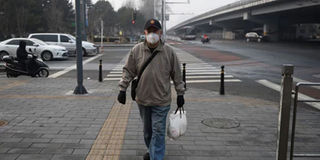President rushed closing of schools

What you need to know:
There were already containment measures in place. Besides, UK has had several cases of people infected and dying of coronavirus, which isn’t the case with Uganda
I think President Museveni rushed to close schools in a country where no case has been reported. There is a general theory that one of the primary functions of government is to keep the people (and the markets) calm. If the people panic, more damage is caused by the panic than by the original problem.
UK delayed closing schools yet it already had seven confirmed cases. Prime Minister Boris Johnson’s hand was most probably forced by Scotland and Wales, but he was reluctant to close schools. He was waiting for the peak of the infection.
There were already containment measures in place. Besides, UK has had several cases of people infected and dying of coronavirus, which isn’t the case with Uganda. There have been 63 cases in Russia even though it has a strong travel, emigration and immigration ties with China. Schools there are still open until today. There have been 256 cases in the whole of Africa, with many from Egypt. UK death toll now stands at 104. Most of the measures President Museveni announced are already applicable in Russia, and that’s how you measure their success.
Border screening, surveillance and control was enough for now. It has served Japan and Singapore well, despite their closeness to China. Between the two, there have been about 1,000 cases. There’s no need to close schools for 32 days in Uganda. It would have been understandable if he had closed only day-schools, but not boarding schools. The whole thing doesn’t make sense at all when markets are still open. It is not sustainable at all- both short-term and long-term. He would have waited a bit longer.
A school is a semi-quarantine place - at least most boarding schools are. The risk in a boarding school is from teachers that do not sleep at school - those that commute. Children are safer in boarding schools than at home in most developing countries. All this panic to close schools will have the opposite effect.
Panic among the population; parents struggling to work and at the same time looking after their children; children wandering on the streets and bringing infections at home; food shortages; private schools will struggle since they do not get any funding from the govt; effect on the economy itself with prices of goods and services going up; future school closures in case the virus starts actually killing people, etc. All this could be avoided with just containment of the virus, eg strict border control and screening.
Uganda being a developing country is exactly the reason why the President should have taken a bit longer before making the decision to close schools.
Strict border control and screening would have been enough for us as we assess the situation. Uganda parents have no iPads or free Internet to keep children busy at home - so, many children are likely to end up on the streets where no one wants them.
It is easier for a parent in a developed world to deal with children at home daily, because of iPads, Netflix, phones, variety of games, etc. I was once a child and student in Uganda, and it’s difficult to stay at home the whole day. Those children will roam around in markets and other places.
Abbey Semuwemba,
[email protected]
I react to your decision to close schools and education institutions in Uganda due to coronavirus threat. Although closing public gathering places like pubs was fair enough, closing schools and all education institutions was an act of panic, especially as there is no confirmed coronavirus case in Uganda yet to justify that action. Such actions should be based on scientific evidence or prediction we call modelling and I wonder what kind of realistic model your advisers used to come to that decision?
This window or period before we have got some confirmed cases should have been put to the best use by schools and higher institutions - and the decision to close them - should have come when there was a number of cases to justify it. It was also wrong to assume that the schools would open in 30 days when any scientist or good adviser would know that by that time, the coronavirus will have spread or reached. So the best advice would have been to keep the situation under constant review with the possibility of keeping the education going on up to the next one to three weeks depending on developments.
As someone living in Europe who has analysed the spread of this virus, I can say the reasons for rapid development of cases in Europe is because of many European-Chinese nationals with dual nationalities or in European-Chinese partnerships, rushing back to Europe. At that time the Wuhan healthcare was being overwhelmed. Fortunately for us in Uganda, the chances of attracting coronavirus exposed victims to our countries to seek better healthcare than in their countries are low.
Robert Muyanja,
[email protected]


